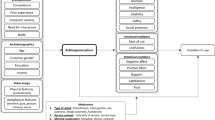Abstract
We introduce the Transregional Collaborative Research Centre “Companion-Technology for Cognitive Technical Systems”—a cross-disciplinary endeavor towards the development of an enabling technology for Companion-systems. These systems completely adjust their functionality and service to the individual user. They comply with his or her capabilities, preferences, requirements, and current needs and adapt to the individual’s emotional state and ambient conditions. Companion-like behavior of technical systems is achieved through the investigation and implementation of cognitive abilities and their well-orchestrated interplay.


Similar content being viewed by others
References
Behnke G, Ponomaryov D, Schiller M, Bercher P, Nothdurft F, Glimm B, Biundo S (2015) Coherence across components in cognitive systems – one ontology to rule them all. In: Proc. of the 25th Int. Joint Conf. on Artificial Intelligence (IJCAI), AAAI Press, pp 1442–1449
Bercher P, Biundo S, Geier T, Hoernle T, Nothdurft F, Richter F, Schattenberg B (2014) Plan, repair, execute, explain—how planning helps to assemble your home theater. In: Proc. of the 24th Int. Conf. on Automated Planning and Scheduling (ICAPS), AAAI Press, pp 386–394
Biundo S, Bercher P, Geier T, Müller F, Schattenberg B (2011) Advanced user assistance based on AI planning. Cogn Syst Res 12(3–4):219–236
Biundo S, Wendemuth A (2010) Von kognitiven technischen Systemen zu Companion-Systemen. Künstliche Intelligenz 24(4):335–339
Biundo S, Wendemuth A (2016) Companion Technology—A Paradigm Shift in Human-Technology Interaction. Springer, Forthcoming
Frommer J, Michaelis B, Rösner D, Wendemuth A, Friesen R, Haase M, Kunze M, Andrich R, Lange J, Panning A, Siegert I (2012) Towards emotion and affect detection in the multimodal last minute corpus. In: Proc. of the Eight Int. Conf. on Language Resources and Evaluation (LREC), European Language Resources Association (ELRA), pp 3064–3069
Glodek M, Geier T, Biundo S, Palm G (2014) A layered architecture for probabilistic complex pattern recognition to detect user preferences. Biol Inspir Cogn Archit 9:46–56
Gugenheimer J, Knierim P, Seifert J, Rukzio E (2014) Ubibeam: An interactive projector-camera system for domestic deployment. In: Proc. of the 9th ACM Int. Conf. on Interactive Tabletops and Surfaces, ITS ’14, ACM, pp 305–310
Handrich S, Al-Hamadi A, Ahmed OR (2012) Improving of gesture recognition using multi-hypotheses object association. In: Proc. of the 5th Int. Image and Signal Processing Conf. (ICISP), Springer, pp. 298–306
Honold F, Schüssel F, Weber M (2014) The automated interplay of multimodal fission and fusion in adaptive HCI. In: Proc. of the 10th Int. Conf. on Intelligent Environments (IE), IEEE, pp 170–177
Ilango A, Shumake J, Wetzel W, Scheich H, Ohl FW (2011) Effects of ventral tegmental area stimulation on the acquisition and long-term retention of active avoidance learning. Behav Brain Res 225(2):515–521
Kächele M, Rukavina S, Palm G, Schwenker F, Schels M (2015) Paradigms for the construction and annotation of emotional corpora for real-world human-computer-interaction. In: Proc. of the Int. Conf. on Pattern Recognition Applications and Methods (ICPRAM), SciTePress, pp 367–373
Kohrs C, Angenstein N, Scheich H, Brechmann A (2010) The temporal contingency of feedback: effects on brain activity. In: Proc. of the Int. Conf. on Aging and Cognition
Nothdurft F, Heinroth T, Minker W (2013) The impact of explanation dialogues on human-computer trust. In: Human-Computer Interaction. Users and Contexts of Use, Springer, pp 59–67
Rösner D, Friesen R, Otto M, Lange J, Haase M, Frommer J (2011) Intentionality in interacting with companion systems—an empirical approach. In: Human-Computer Interaction. Towards Mobile and Intelligent Interaction Environments, LNCS, Springer, 6763: 593–602
Schattenberg, B, Schulz AL, Brechmann A, Ohl FW, Biundo S (2012) Planning models for two-way avoidance and reversal learning. In: Proc. of the 7th Vienna Int. Conf. on Mathematical Modelling (MATHMOD)
Schwenker F, Scherer S, Morency, L (2015) Multimodal Pattern Recognition of Social Signals in Human-Computer-Interaction, Lecture Notes in Computer Science, vol 8869. Springer
Siegert I, Ohnemus K (2015) A new dataset of telephone-based human-human call-center interaction with emotional evaluation. In: Proc. of the First International Symposium on Companion Technology (ISCT)
Walter S, Scherer S, Schels M, Glodek M, Hrabal D, Schmidt M, Böck R, Limbrecht K, Traue HC, Schwenker F (2011) Multimodal emotion classification in naturalistic user behavior. In: Proc. of the 14th Int. Conf. on Human Computer Interaction (HCI), Springer, pp 603–611
Wendemuth A, Biundo S (2012) A companion technology for cognitive technical systems. In: Cognitive Behavioural Systems, Lecture Notes in Computer Science, Springer, pp 89–103
Acknowledgments
The Transregional Collaborative Research Centre SFB/TRR 62 “Companion-Technology for Cognitive Technical Systems” (www.companion-technology.org) is funded by the German Research Foundation (DFG).
Author information
Authors and Affiliations
Corresponding author
Rights and permissions
About this article
Cite this article
Biundo, S., Wendemuth, A. Companion-Technology for Cognitive Technical Systems. Künstl Intell 30, 71–75 (2016). https://doi.org/10.1007/s13218-015-0414-8
Published:
Issue Date:
DOI: https://doi.org/10.1007/s13218-015-0414-8



